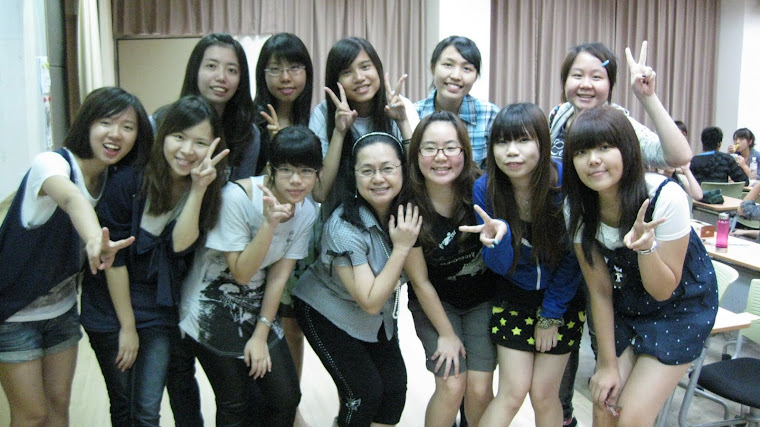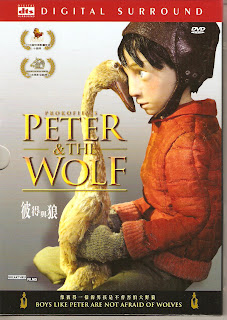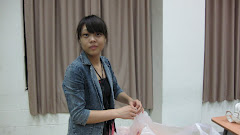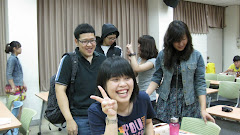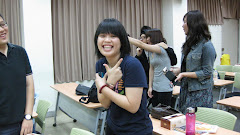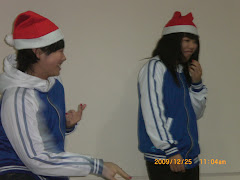Some Suggestions for Extended Readings:
(1) Inkheart, Inkspell, and Inkdeath
(2) Eragon
(3) The Golden Compass
(4) A Series of Unfortunate Events
(5) Stardust
6/21/10
Topic Fourteen: Inkheart
Discussion Topic Fourteen (2010/6/7~6/13): The Magic of Reading Aloud in the World of Inkheart
In 2003, the German writer Cornelia Funke published her novel entitled Inkheart, which was immediately translated into English and became a bestseller.
Funke continued to write its sequels, i.e., Inkspell and Inkdeath.
The story of Inkheart was adapted into a movie with the same title, in which this timeless tale about books, imgaination and life was re-told with vivid images and exciting plot.
Discussion Questions:
(1) Would you enjoy the ability to "read people out" from the books?
(2) If you did command this gift, which character(s) from the book would you like to "read out"? Why?
(2) What is the message conveyed in this novel, especially with the special talent of "silver tongue?"
In 2003, the German writer Cornelia Funke published her novel entitled Inkheart, which was immediately translated into English and became a bestseller.
Funke continued to write its sequels, i.e., Inkspell and Inkdeath.
The story of Inkheart was adapted into a movie with the same title, in which this timeless tale about books, imgaination and life was re-told with vivid images and exciting plot.
Discussion Questions:
(1) Would you enjoy the ability to "read people out" from the books?
(2) If you did command this gift, which character(s) from the book would you like to "read out"? Why?
(2) What is the message conveyed in this novel, especially with the special talent of "silver tongue?"
Topic Twelve: Peter and the Wolf
Discussion Topic Twelve (2010/5/24~5/30): Different versions of Peter and Wolf
We have introduced various versions of Peter and Wolf in the class.
Discussion Question: Do you prefer a more faithful adaption of Peter and Wolf or a more creative but less faithful rendering of the original work? Why?
We have introduced various versions of Peter and Wolf in the class.
(1) The original musical tale is composed by Serge Prokofiev (1891~1953) and the story is narrated by the Academy Award winning actor Jack Lemmon.
(2) The cartoon animation of Peter and Wolf is quite faithful to the original work and is intended for children's viewing.
(3) With the adoption of computer-generated images, the 2006 version of Peter and Wolf has presented Peter in a more sophisticated light. In some situations, Peter even shows the expressions of malice and evil.
Discussion Question: Do you prefer a more faithful adaption of Peter and Wolf or a more creative but less faithful rendering of the original work? Why?
Topic Eleven: Howl's Moving Castle
Discussion Topic Eleven(2010/5/17~5/23): Howl's Moving Castle
In 1986, the British writer Diana Wynne Jones created the story of Howl's Moving Castle.
In 2004, Miyazaki and Ghibli Studio
adapted the original story written by Diana Wynne Jones and turned it into an animation movie.
Discussion Question:
How did Sophie manage to break
(1) the bond between Howl and Calcifer, and
(2) the curse imposed upon her by the Witch of the Wasteland?
In 1986, the British writer Diana Wynne Jones created the story of Howl's Moving Castle.
In 2004, Miyazaki and Ghibli Studio
adapted the original story written by Diana Wynne Jones and turned it into an animation movie.
Discussion Question:
How did Sophie manage to break
(1) the bond between Howl and Calcifer, and
(2) the curse imposed upon her by the Witch of the Wasteland?
Topic Ten: Images from the Little Prince (2)
In the Little Prince,  the narrator of the story drew a sketch of the Little Prince from his memory and commented: "Here you may see the best portrait that, later, I was able to make of him." As you can see, this is indeed a very lovely rendering of a little boy full of life.
the narrator of the story drew a sketch of the Little Prince from his memory and commented: "Here you may see the best portrait that, later, I was able to make of him." As you can see, this is indeed a very lovely rendering of a little boy full of life.
 the narrator of the story drew a sketch of the Little Prince from his memory and commented: "Here you may see the best portrait that, later, I was able to make of him." As you can see, this is indeed a very lovely rendering of a little boy full of life.
the narrator of the story drew a sketch of the Little Prince from his memory and commented: "Here you may see the best portrait that, later, I was able to make of him." As you can see, this is indeed a very lovely rendering of a little boy full of life.After the Little Prince was gone, the narrator drew the picture of a special landscape from his memory, and described this landscape as "the loveliest and saddest landscape in the world."
Discussion Question: What does this landscape mean to the narrator and to you?
Topic Nine: Images from The Little Prince (1)
Chocolate Factory: Studio Experience
Special Task on 2010/6/21: Experience at NTUT Studio
At NTUT Multi-media Studio, the whole class did a voice presentation of the play Charlie and the Chocolate Factory, adapted from Roald Dahl's novel by Richard George. There are eleven scenes in this play, and all the mp3 files of today's voice presentation would be uploaded to "Vinia168" at YouTube.
Discussion Question: Did you enjoy the experience of having your voice presentation of a play recorded on mp3 files?
The Third Scene 3
The Fourth Scene 4
The Fifth Scene 5
Topic Thirteen: Charlie and the Chocolate Factory
Discussion Topic Thirteen (2010/5/31~6/6): The Reasons Why Charlie Became the Winner of Wonka's Chocolate Factory
Roland Dahl (1916~1990) wrote the original story of Charlie and the Chocolate Factory, which was adapted into a play by Richard George in 1976.
George's playscript is interesting and fun to read aloud. All the students enrolled in this class would have a voice presentation of the whole play first in the classroom and then in the multi-media studio at NTUT.
The story was adapted into a movie script in 2004, and the movie won an immediate global applaud not only with children but also with adault audience.
However, there are questions awaiting to be explored.
For one, as Mr. Wonka's guests, Augustus, Veruca, Violet and Mike were punished due to their indescent manners or improper attitude, and Charlie was the only one left to become the winner who eventually would inherite the chocolate factory.
Discussion Questions:
(1) Do you think that Mr. Wonka is entitled to punish other people's children?
(2) Do you think each of the children deserve the punishment he/she has received?
(3) What are the special qualities that Charlie embodies that have led him to the inheritance of a dream factory?
Roland Dahl (1916~1990) wrote the original story of Charlie and the Chocolate Factory, which was adapted into a play by Richard George in 1976.
George's playscript is interesting and fun to read aloud. All the students enrolled in this class would have a voice presentation of the whole play first in the classroom and then in the multi-media studio at NTUT.
The story was adapted into a movie script in 2004, and the movie won an immediate global applaud not only with children but also with adault audience.
However, there are questions awaiting to be explored.
For one, as Mr. Wonka's guests, Augustus, Veruca, Violet and Mike were punished due to their indescent manners or improper attitude, and Charlie was the only one left to become the winner who eventually would inherite the chocolate factory.
Discussion Questions:
(1) Do you think that Mr. Wonka is entitled to punish other people's children?
(2) Do you think each of the children deserve the punishment he/she has received?
(3) What are the special qualities that Charlie embodies that have led him to the inheritance of a dream factory?
6/20/10
Topic Eight: Shuan-tzan as a Traveller
Discussion Topic Eight (April 26~May 2, 2010):
One of them is Shuan-tzan's portrait as a traveller on his way to ancient India.
Question: Why is this painting cited in this movie about time travelling?
Topic Seven: The Girl Who Leapt through Time
Discussion Topic Seven (2010/4/19~4/25):
The animation movie entitled "The Girl Who Leapt through Time" tells a story about a teenage girl's choices of her love and her future career in the labyrinth of time.
Question: What is the movie trying to tell us?
4/14/10
Topic Six: Benjamin Bunny Play, Group Seven
Discussion Topic (2010/4/12~4/18): : To adopt or adapt the orginal story of "Benjamin Bunny" by Beatrix Potter
Discussions Questions:
(1) Do you like your presentation of the story on the stage?
(2) Did you "adopt" or "adapt" the original story?
a. Were you trying to be 100% "faithful" to the original story?
b. Did you do some changes to the original story? Why did you make the changes?
(3)What improvement will you make if you are going to present the play again on the stage? Why?
GROUP SEVEN: Photos and Discussions
Discussions Questions:
(1) Do you like your presentation of the story on the stage?
(2) Did you "adopt" or "adapt" the original story?
a. Were you trying to be 100% "faithful" to the original story?
b. Did you do some changes to the original story? Why did you make the changes?
(3)What improvement will you make if you are going to present the play again on the stage? Why?
GROUP SEVEN: Photos and Discussions
Topic Six: Benjamin Bunny Play, Group Six
Discussion Topic (2010/4/12~4/18): : To adopt or adapt the orginal story of "Benjamin Bunny" by Beatrix Potter
Discussions Questions:
(1) Do you like your presentation of the story on the stage?
(2) Did you "adopt" or "adapt" the original story?
a. Were you trying to be 100% "faithful" to the original story?
b. Did you do some changes to the original story? Why did you make the changes?
(3)What improvement will you make if you are going to present the play again on the stage? Why?
GROUP SIX: Photos and Discussions
Discussions Questions:
(1) Do you like your presentation of the story on the stage?
(2) Did you "adopt" or "adapt" the original story?
a. Were you trying to be 100% "faithful" to the original story?
b. Did you do some changes to the original story? Why did you make the changes?
(3)What improvement will you make if you are going to present the play again on the stage? Why?
GROUP SIX: Photos and Discussions
Topic Six: Benjamin Bunny Play, Group Five
Discussion Topic (2010/4/12~4/18): : To adopt or adapt the orginal story of "Benjamin Bunny" by Beatrix Potter
Discussions Questions:
(1) Do you like your presentation of the story on the stage?
(2) Did you "adopt" or "adapt" the original story?
a. Were you trying to be 100% "faithful" to the original story?
b. Did you do some changes to the original story? Why did you make the changes?
(3)What improvement will you make if you are going to present the play again on the stage? Why?
GROUP FIVE: Photos and Discussions
Discussions Questions:
(1) Do you like your presentation of the story on the stage?
(2) Did you "adopt" or "adapt" the original story?
a. Were you trying to be 100% "faithful" to the original story?
b. Did you do some changes to the original story? Why did you make the changes?
(3)What improvement will you make if you are going to present the play again on the stage? Why?
GROUP FIVE: Photos and Discussions
Topic Six: Benjamin Bunny Play, Group Four
Discussion Topic (2010/4/12~4/18): : To adopt or adapt the orginal story of "Benjamin Bunny" by Beatrix Potter
Discussions Questions:
(1) Do you like your presentation of the story on the stage?
(2) Did you "adopt" or "adapt" the original story?
a. Were you trying to be 100% "faithful" to the original story?
b. Did you do some changes to the original story? Why did you make the changes?
(3)What improvement will you make if you are going to present the play again on the stage? Why?
GROUP FOUR: Photos and Discussions
Discussions Questions:
(1) Do you like your presentation of the story on the stage?
(2) Did you "adopt" or "adapt" the original story?
a. Were you trying to be 100% "faithful" to the original story?
b. Did you do some changes to the original story? Why did you make the changes?
(3)What improvement will you make if you are going to present the play again on the stage? Why?
GROUP FOUR: Photos and Discussions
Topic Six: Benjamin Bunny Play, Group Three
Discussion Topic (2010/4/12~4/18): : To adopt or adapt the orginal story of "Benjamin Bunny" by Beatrix Potter
Discussions Questions:
(1) Do you like your presentation of the story on the stage?
(2) Did you "adopt" or "adapt" the original story?
a. Were you trying to be 100% "faithful" to the original story?
b. Did you do some changes to the original story? Why did you make the changes?
(3)What improvement will you make if you are going to present the play again on the stage? Why?
GROUP THREE: Photos and Discussions
Discussions Questions:
(1) Do you like your presentation of the story on the stage?
(2) Did you "adopt" or "adapt" the original story?
a. Were you trying to be 100% "faithful" to the original story?
b. Did you do some changes to the original story? Why did you make the changes?
(3)What improvement will you make if you are going to present the play again on the stage? Why?
GROUP THREE: Photos and Discussions
Topic Six: Benjamin Bunny Play, Group Two
Discussion Topic (2010/4/12~4/18): : To adopt or adapt the orginal story of "Benjamin Bunny" by Beatrix Potter
Discussions Questions:
(1) Do you like your presentation of the story on the stage?
(2) Did you "adopt" or "adapt" the original story?
a. Were you trying to be 100% "faithful" to the original story?
b. Did you do some changes to the original story? Why did you make the changes?
(3)What improvement will you make if you are going to present the play again on the stage? Why?
GROUP TWO: Photos and Discussions
Discussions Questions:
(1) Do you like your presentation of the story on the stage?
(2) Did you "adopt" or "adapt" the original story?
a. Were you trying to be 100% "faithful" to the original story?
b. Did you do some changes to the original story? Why did you make the changes?
(3)What improvement will you make if you are going to present the play again on the stage? Why?
GROUP TWO: Photos and Discussions
Topic Six: Benjamin Bunny Play, Group One
Discussion Topic (2010/4/12~4/18): : To adopt or adapt the orginal story of "Benjamin Bunny" by Beatrix Potter
Discussions Questions:
(1) Do you like your presentation of the story on the stage?
(2) Did you "adopt" or "adapt" the original story?
a. Were you trying to be 100% "faithful" to the original story?
b. Did you do some changes to the original story? Why did you make the changes?
(3)What improvement will you make if you are going to present the play again on the stage? Why?
GROUP ONE: Photos and Discussions
Discussions Questions:
(1) Do you like your presentation of the story on the stage?
(2) Did you "adopt" or "adapt" the original story?
a. Were you trying to be 100% "faithful" to the original story?
b. Did you do some changes to the original story? Why did you make the changes?
(3)What improvement will you make if you are going to present the play again on the stage? Why?
GROUP ONE: Photos and Discussions
3/29/10
Topic Five: "Taming" in ""Fox and I" 馴服的意義
Discussion Topic Five (2010/3/29~4/11):
Discussion Topics:
(1) What does it mean by "taming" ?
(2) Had the little girl tamed the fox eventually?
Based on The Little Prince, the story of "The Fox and I" portrays a story in which a ten-year old girl was trying hard to make friends with a fox in the wilderness.
The story tells us the secret of making friends as well as the difficult lesson of letting go this friend eventually.
Please consider the following points:
* What strategies did the little girl adopt to establish a relationship with the fox?
*How did the fox come to accept the girl as a friend? How did it overcome the fear of humans and then open her family to the girl?
*In the later part of their relationship, the little girl thought of putting a collar around the neck of the fox and even introducing her into the house and subsequently her sleeping chamber. By doing this, had the little girl made any mistakes in terms of friendship?
*After the little girl grew up to be a mother, what did she think of the fox's departure from her (after the fox's recovering from the wound)? Did she think that the fox has betryed their friendship? Had she learned to accept this separation?
*Whom was actually tamed in the end?
Discussion Topics:
(1) What does it mean by "taming" ?
(2) Had the little girl tamed the fox eventually?
Based on The Little Prince, the story of "The Fox and I" portrays a story in which a ten-year old girl was trying hard to make friends with a fox in the wilderness.
The story tells us the secret of making friends as well as the difficult lesson of letting go this friend eventually.
Please consider the following points:
* What strategies did the little girl adopt to establish a relationship with the fox?
*How did the fox come to accept the girl as a friend? How did it overcome the fear of humans and then open her family to the girl?
*In the later part of their relationship, the little girl thought of putting a collar around the neck of the fox and even introducing her into the house and subsequently her sleeping chamber. By doing this, had the little girl made any mistakes in terms of friendship?
*After the little girl grew up to be a mother, what did she think of the fox's departure from her (after the fox's recovering from the wound)? Did she think that the fox has betryed their friendship? Had she learned to accept this separation?
*Whom was actually tamed in the end?
Beatrix Potter:Midterm project and group work
Midtern porject (3/29/2010~4/19):
A self-made story book based on Beatrix Potter's The Tale of Peter Rabbit
Group work of drama adaptation(3/29~4/12):
The presentation of a play based on Beatrix Potter's The Tale of Banjamin Bunny
A self-made story book based on Beatrix Potter's The Tale of Peter Rabbit
Group work of drama adaptation(3/29~4/12):
The presentation of a play based on Beatrix Potter's The Tale of Banjamin Bunny
Subscribe to:
Comments (Atom)

